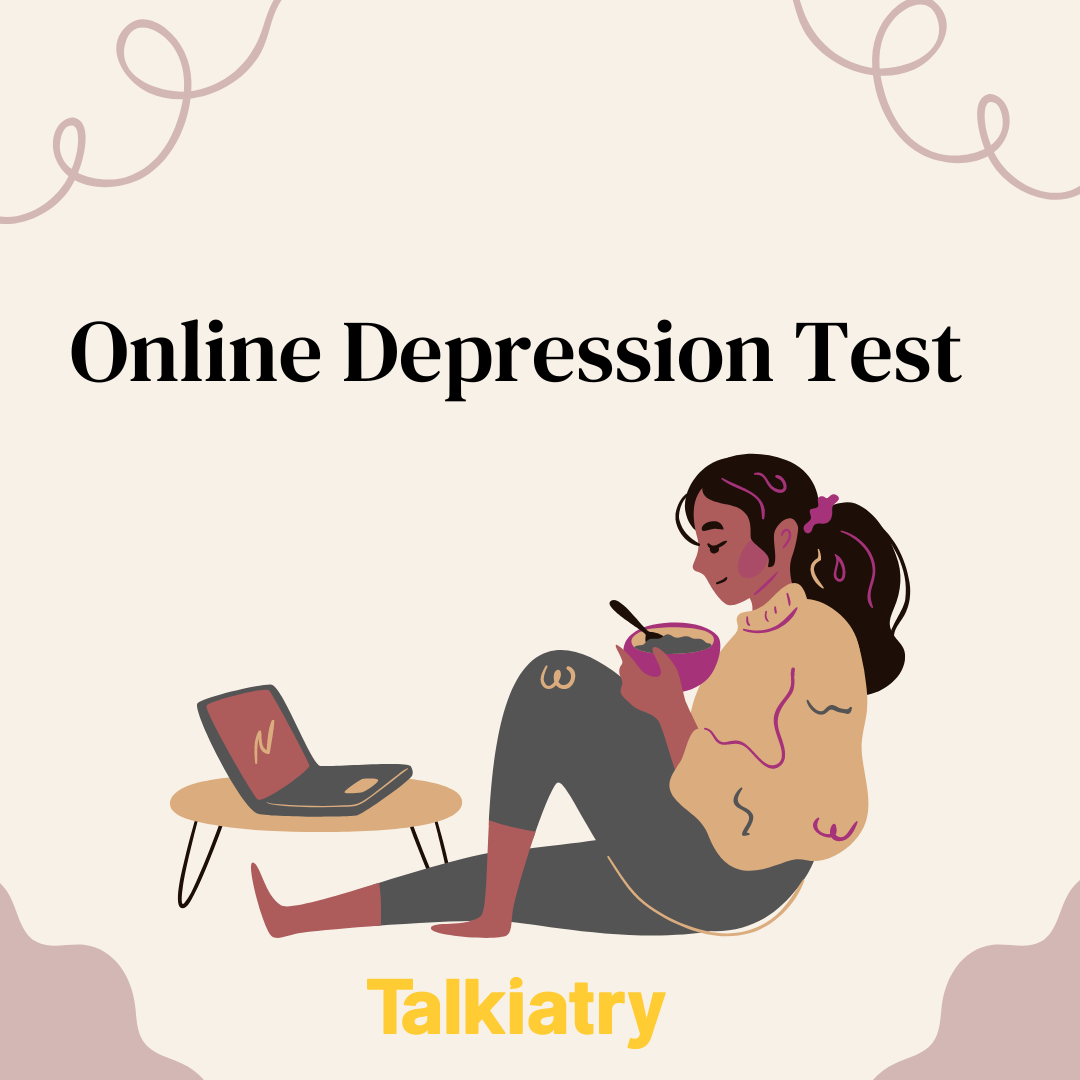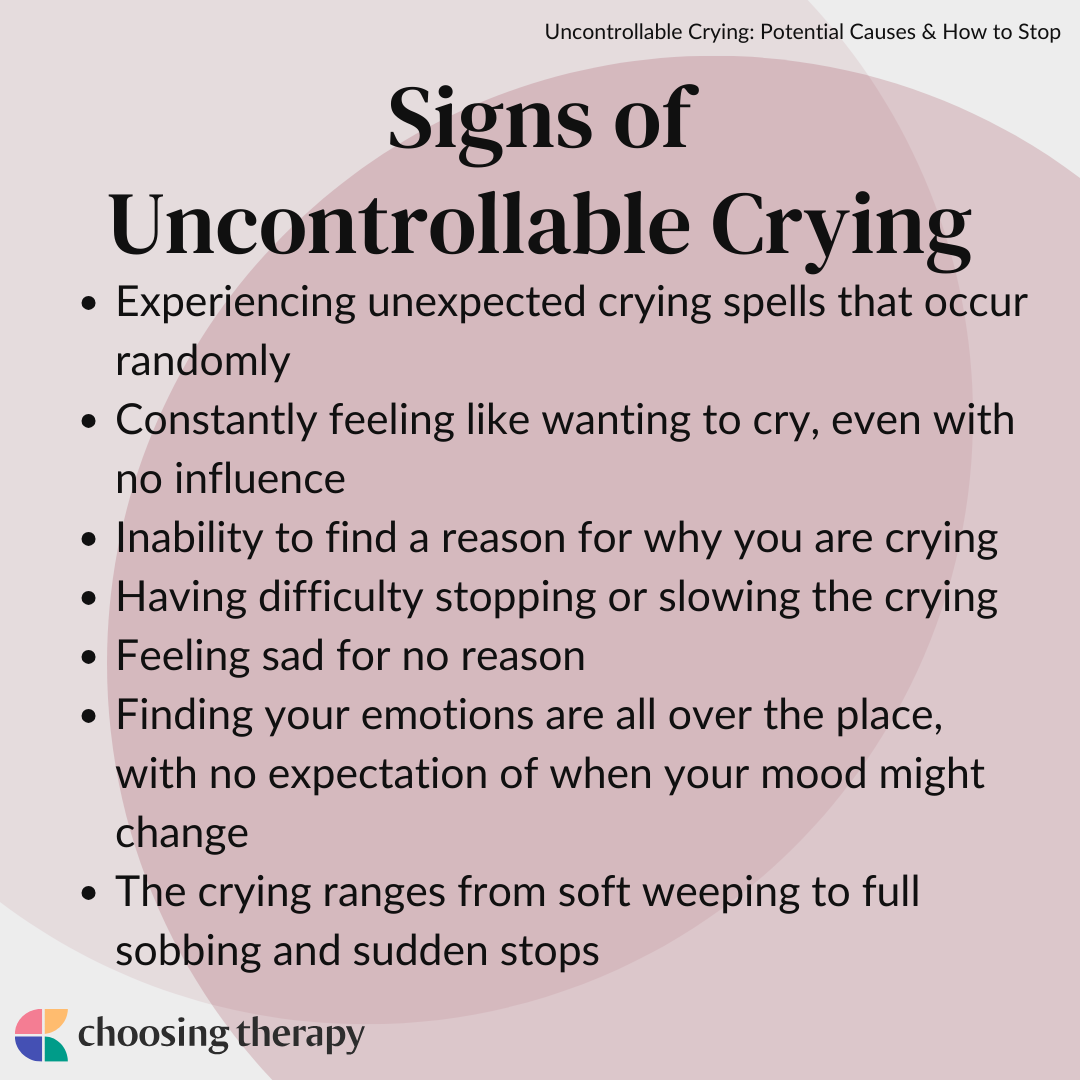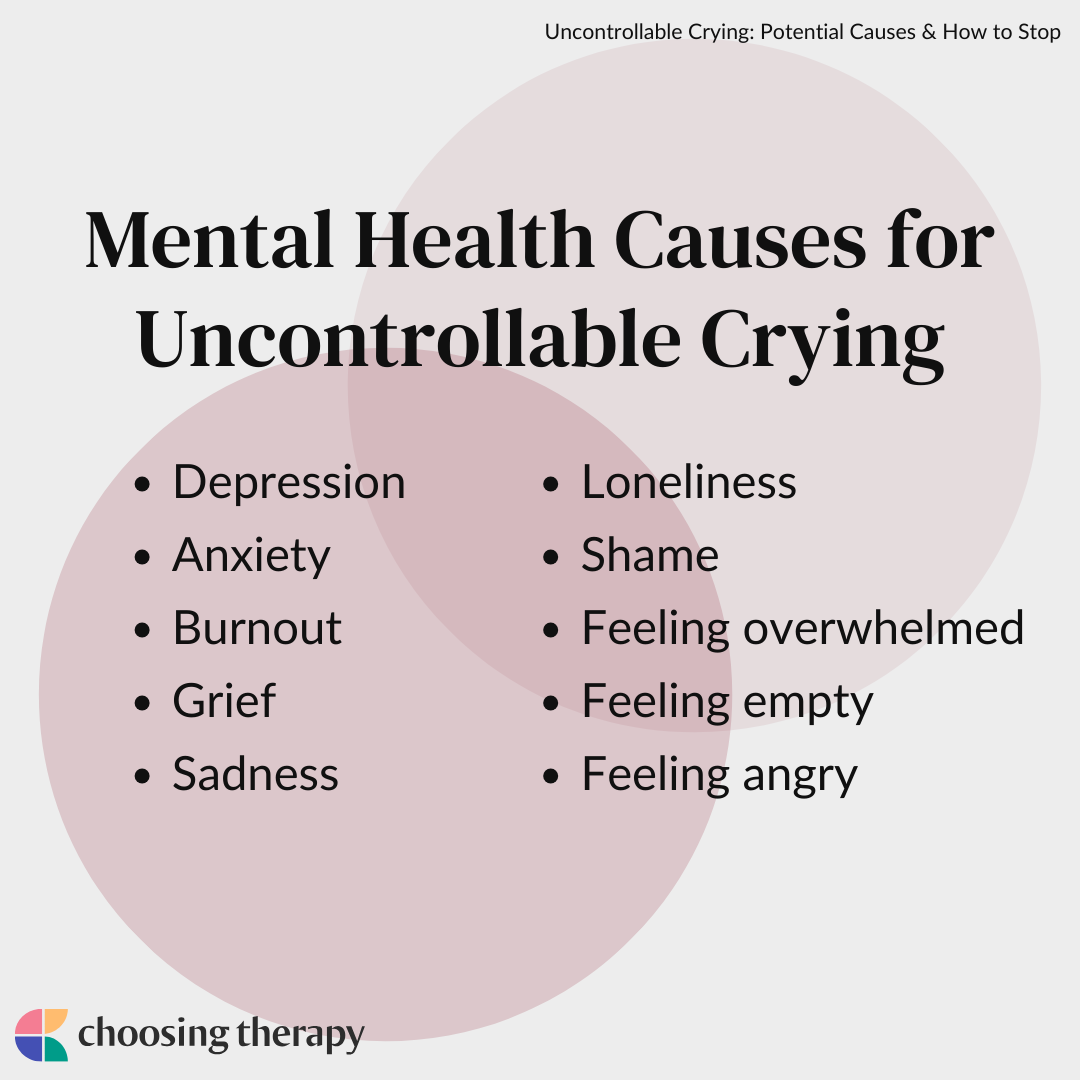Experiencing uncontrollable crying spells can be a frustrating and embarrassing experience, especially if there is no apparent influence and limited ability to stop these episodes. Several mental and physical health issues can influence these spells. Thankfully, resources exist to help with these crying spells, including therapy, checking in with a primary care doctor, and coping skills to help with the feeling of being out of control.
Depression Is Treatable With Therapy
Would you like to feel more happiness and joy? BetterHelp has over 20,000 licensed therapists who provide convenient and affordable online therapy. BetterHelp starts at $65 per week. Take a Free Online Assessment and get matched with the right therapist for you.
Signs of Uncontrollable Crying
People experience uncontrollable crying at different levels of severity and for various reasons. However, crying uncontrollably is more common when people experience difficult situations like grieving the loss of a loved one or losing their job. While grief and loss are common amongst most people, uncontrollable crying for no reason is not. These episodes differ from feelings of sadness in that the crying won’t stop, the feelings don’t go away, and they are often unexplainable.1
Signs of uncontrollable crying include:1
- Experiencing unexpected crying spells that occur randomly
- Constantly feeling like wanting to cry, even with no influence
- Inability to find a reason for why you are crying
- Having difficulty stopping or slowing the crying
- Feeling sad for no reason
- Finding your emotions are all over the place, with no expectation of when your mood might change
- The crying ranges from soft weeping to full sobbing and sudden stops
Why Am I Crying Uncontrollably?
As uncontrollable crying is a persistent and rare condition, people experiencing this may begin to feel isolated, frustrated, and overwhelmed. Some people may ask why they’re crying for no reason, which may be a similar experience to uncontrollable crying or feeling like you cry all the time, but usually does not meet the same lack of control over the severity and frequency of their crying.
It is important to note that uncontrollable crying symptoms are seen more commonly in different periods of human development (like infancy), and are often influenced by hormone changes and social expectations.2 However, uncontrollable crying spells tend to be more influenced by our mental health and physiology, which supersedes someone’s identified population.
Examples of groups and populations who have a higher chance of experiencing uncontrollable crying include:
- In infancy and toddlerhood: It is not uncommon to witness an uncontrollable crying spell or two when a child is struggling to communicate or unable to process their emotions.
- During puberty and menopause: Major hormonal changes play a significant role in human development. It is not uncommon for changes in brain chemistry from increased testosterone or estrogen to lead to uncontrollable crying.
- The societal expectation of women: Researchers have noted that, due to the development of gender differentiation in society, females tend to cry more than males.2
Depression Is Treatable With Therapy
Would you like to feel more happiness and joy? BetterHelp has over 20,000 licensed therapists who provide convenient and affordable online therapy. BetterHelp starts at $65 per week. Take a Free Online Assessment and get matched with the right therapist for you.
Mental Health Causes for Uncontrollable Crying
Uncontrollable crying spells have several potential mental health causes, which can include feelings of anxiety, depression, grief, and negative self-talk Mental health diagnoses can take time to diagnose and treat, which creates even further distress over experiencing uncontrollable crying spells.
Mental health reasons for crying uncontrollably include:
Depression
Depressive feelings and symptoms can significantly influence uncontrollable crying. Depression tends to include feelings of loneliness, sadness, and anxiety. People with different types of depression can experience recurring periods of low energy, lack of motivation, appetite, suicidal ideation, and tearfulness.1
Anxiety
Anxiety can quickly lead to out-of-control crying if you start ruminating over your fear of the future or present. These negative thought patterns create irritability, increased sensitivity, and restlessness, which can become too overwhelming for individuals. When someone can no longer manage their emotions of anxiety, this can lead to unmanageable tearfulness until the anticipated problems take place.1
Burnout
Burnout is becoming a common diagnosis when someone experiences lowered motivation, procrastination, and self-loathing. This build-up of emotions can lead people to fantasize about leaving work and reduce their performance or interest in what they do. The fallout from our ability to maintain our work and life obligations from burnout can cause uncontrollable crying and long-term mental and physical health disorders.
Grief
Without proper ways to cope with grief and loss, it can feel like you’ve lost all control over your life, including your ability to stop crying spells. This distress is felt after losing someone or something important to you, such as a pet, family member, friend, or even your job. Grief can often lead to depression, anxiety, and anger, bringing about tearfulness and uncontrollable crying.
Sadness
Sadness is a common experience that often occurs with crying. When sadness overwhelms, tearfulness and uncontrollable crying spells can occur regardless of why it happens. Although they share common characteristics, knowing the signs of depression versus sadness is crucial to help you identify the causes of your uncontrollable crying.
Loneliness
Loneliness can significantly isolate people and often carries feelings of sadness by having limited social interactions and difficulty connecting with others. It is not uncommon for individuals to experience tearfulness and uncontrollable crying spells when they don’t have people to share in their feelings and emotions. If the negative impacts of loneliness become too intense and traumatic, people can develop monophobia (a fear of being alone) which can make loneliness a trigger for uncontrollable crying.
Shame
This experience can influence feelings of depression, embarrassment, sadness, and turbulent crying spells. Shame is a complex experience that often results from negative thoughts that you are inadequate, developing into higher levels of toxic shame. It is a complex emotion that also influences your self-perception and usually leaves people trying to differentiate their feelings between shame and guilt.
Feeling Overwhelmed
Experiencing heightened levels of stress can make you unable to cope when overwhelmed by life’s challenges. It is not uncommon to experience burnout, feeling pressed and limited in time, and tearfulness or crying spells when feeling overwhelmed.1
Feeling Empty
This feeling is a compounded emotion as it carries several conditions (i.e., loneliness, dissociation, and feeling numb) that develop in response to a problematic situation or loss of self-worth and self-esteem. When considering the immense negative emotions that come with feelings of emptiness, it is not surprising that it can induce crying spells.1
Feeling Angry
Although it may sound counterintuitive, crying and anger can occur together. This uncontrollable crying can be an emotional outburst from pent-up anger, and when depression and anger or anxiety and anger intertwine. When you feel overwhelmed by feelings of anger and accompanying emotions, such as hurt, guilt, regret, and sadness, anger can influence “angry tears” and crying spells.
Neurological Causes for Crying Uncontrollably
Neurological issues or disorders can also cause uncontrollable crying spells. The role of the brain is to help someone physically, emotionally, and cognitively; if there are neurological concerns, this can impact an individual’s functioning in several areas. Some neurological conditions that cause uncontrollable crying spells include Alzheimer’s, ALS, and Pseudobulbar Affect, which all impact cognitive and neurological functioning.
Reasons why neurological disorders can lead to crying uncontrollably include:
- Alzheimer’s: This disease slowly but surely impacts memory and cognition, which is also part of emotional regulation. Research indicates an overlap between Alzheimer’s and depression in about 20% of people. However, their symptoms are more fluid, including uncontrollable crying spells and anger outbursts.3
- ALS: Also known as Lou Gehrig’s Disease, this terminal disease deteriorates one’s ability to use muscles and other body parts. Many ALS patients report not knowing that they would experience the cognitive changes or emotional lability that can occur along with ALS. In one study, 46% of participants reported not being informed by their doctors about emotional lability, which is involved in regulating one’s mood and controlling crying spells.4 This appears to be a limited area of focus for treatment in those with ALS and should be addressed more frequently.
- Stroke: Strokes result from stopped blood supply to the brain, which can cause physical and cognitive issues. In addition to cognitive problems, depression after a stroke can be a common experience, especially considering the physical and mental rehabilitation process of recovery. Each of these factors can cause uncontrollable crying spells.
- Pseudobulbar Affect (PBA): PBA is a neurological condition that occurs in individuals with specific neurological factors or, more commonly, some kind of brain injury. These individuals experience emotional lability, also called emotional incontinence, in which they exhibit uncontrollable laughing or crying spells that start and stop suddenly without warning.5
- Parkinson’s: Parkinson’s is a nervous system disorder that impacts people’s ability to move, walk, and, sometimes, talk. In addition, this disorder can cause a chemical imbalance that can put an individual at risk for a mood disorder and emotional lability, such as uncontrolled crying spells and lashing out. Parkinson’s and depression carry a high correlation with each other due to the heavy emotional and physical toll of the disease.
Impacts of Uncontrollable Crying
Experiencing uncontrollable crying can be confusing and frustrating, especially if you do not know why it is happening. Regardless of the cause of the crying, the spells can impact several areas of one’s life as they can be an intrusion on routine and feelings of stability. Even though these spells are not as common, many people learn to live with them and seek help when needed.
Impacts of uncontrollable crying can include:6
- Isolation
- Missing essential events
- Social embarrassment
- Limited connection with others
- Potential issues at work, school, or outside hobbies
- Difficult emotions surrounding the crying
How to Stop Crying Uncontrollably
It can be hard to imagine how one might be able to stop crying spells when there is no cause and they are unpredictable. However, there are ways to prevent and slow these crying spells, including distraction, monitoring your triggers, and relaxation skills.
Here are eight ways to stop or limit uncontrollable crying spells:
- Engage in relaxation skills like breathwork, such as deep breathing through the nose, putting your tongue to the roof of your mouth to slow your brain down, and progressive muscle relaxation.1
- Find healthy distractions, such as focusing on another event, changing your thought process through cognitive restructuring, or counting parts of the area around you.1
- Practice grounding techniques, such as turning a ring on your hand for touch, counting things you can smell or hear, or lightly pinching your skin if that is helpful for you.
- Switch up your surroundings by practicing walking meditation and give yourself a break from the current stimuli.1
- Get in touch with the benefits of nature, which may reduce stress, anxiety, and depressive emotions.1 Accessing nature can be done through adventure therapy or ecotherapy.
- Engage nerves in your body, such as your vagus nerve (done by relaxing your stomach), which can help your brain calm you physically and mentally.1
- Journal your crying episodes to monitor if a pattern, trigger, or particular stimulus may play a role.1
- If you are able, consider exercising, which can help release dopamine to make you feel better and potentially change your mood.1
When to Get Help for Uncontrollable Crying
If you are experiencing uncontrollable crying spells, you may be wondering whether to seek therapy. Professional help is always an option, especially if you struggle with mental health symptoms and additional issues related to the spells. If you are experiencing significant life stressors in several areas of your life, seeking help to process what is happening and how to cope is the best way forward.
Knowing how to seek therapy can be difficult, especially if this is your first time. Therapists can often treat depression, anxiety, trauma, and other mental health disorders that may be the underlying issues of uncontrollable crying. Finding a therapist can feel daunting, but you can ask your primary care provider for a referral, ask a trusted loved one, or use an online therapist directory to get started.
In My Experience
Additional Resources
To help our readers take the next step in their mental health journey, Choosing Therapy has partnered with leaders in mental health and wellness. Choosing Therapy is compensated for marketing by the companies included below.
Talk Therapy
Online-Therapy.com – Get support and guidance from a licensed therapist. Online-Therapy.com provides 45 minute weekly video sessions and unlimited text messaging with your therapist for only $64/week. Get Started
Online Psychiatry
Hims / Hers If you’re living with anxiety or depression, finding the right medication match may make all the difference. Connect with a licensed healthcare provider in just 12 – 48 hours. Explore FDA-approved treatment options and get free shipping, if prescribed. No insurance required. Get Started
Depression Newsletter
A free newsletter from Choosing Therapy for those impacted by depression. Get helpful tips and the latest information. Sign Up
Learn Anti-Stress & Relaxation Techniques
Mindfulness.com – Change your life by practicing mindfulness. In a few minutes a day, you can start developing mindfulness and meditation skills. Free Trial
Choosing Therapy Directory
You can search for therapists by specialty, experience, insurance, or price, and location. Find a therapist today.
Online Depression Test A few questions from Talkiatry can help you understand your symptoms and give you a recommendation for what to do next. Best Online Psychiatry Services Online psychiatry, sometimes called telepsychiatry, platforms offer medication management by phone, video, or secure messaging for a variety of mental health conditions. In some cases, online psychiatry may be more affordable than seeing an in-person provider. Mental health treatment has expanded to include many online psychiatry and therapy services. With so many choices, it can feel overwhelming to find the one that is right for you.









